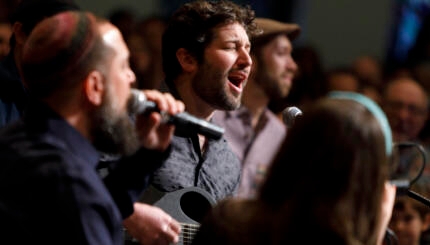The Jewish obsession with memory is but one example of how our tradition intuitively understood the nature of the human brain.
Starting with the Bible, Jewish literature exhibits an intense focus on the subject of memory. The verb lizchor appears 228 times in the Bible, referring to elements as diverse as Shabbat, Miriam’s leprosy, and Amalek’s attack on the Israelites. The Torah repeatedly tells us that the basis of any number of mitzvot is “because you were slaves in Egypt” — thereby using our sense of collective memory to promote contemporary empathy and compassion for others.
But Jewish tradition understood that simply mentioning past events is not enough to solidify a memory. In order to embed memory in the brain, intentional action helps. Jewish holiday rituals are mechanisms to revisit our deepest values through our shared memories: the Exodus from Egypt, the revelation at Sinai, the creation of the world. By reenacting these experiences, even those of us who were not physically present at these events “remember” them as if we were.
This focus on communal memory is also what makes the Yizkor ceremony all the more striking; it is the exception which proves the rule.

Help us keep Jewish knowledge accessible to millions of people around the world.
Your donation to My Jewish Learning fuels endless journeys of Jewish discovery. With your help, My Jewish Learning can continue to provide nonstop opportunities for learning, connection and growth.
Yizkor (literally “he will remember”) is a memorial prayer, traditionally recited by individuals who have lost a close family member. It is said four times during the year — on Yom Kippur, and on each of the pilgrimage festivals: Passover, Shavuot and Sukkot. It is also is the one moment in the liturgical calendar when we call upon individual memory as opposed to communal memory.
Instead of collectively conjuring a moment of our shared past, each of us recites a personal prayer for individual relatives who have died. Unlike a funeral or shiva, where our individual memories are shared publicly and form a collective mosaic of the person we are remembering, Yizkor provides a communal space for individual internal reflection and inward memorializing.
Jewish tradition may not provide a reason for this liturgical anomaly, but perhaps neuroscience does. Memories, we are now discovering, are not static. The very act of remembering seems to alter the memory itself. As Joshua Foer describes in his book “Moonwalking With Einstein,” memories change as they age.
“Each time we think about a memory, we integrate it more deeply into our web of other memories, and therefore make it more stable and less likely to be dislodged,” Foer writes. “But in the process, we also transform the memory, and reshape it – sometimes to the point that our memories of events bear only a passing resemblance to what actually happened.”
In other words, neuroscientists are describing what we all know from experience: memory is imperfect. Each time we recall a memory, we are not playing a mental recording of actual events, but drawing on our subjective experience of that event. The very act of recalling the memory seems to physically alter the memory itself. Ironically, remembering changes the memory.
This may be the key to understanding why Jewish tradition created a memorial ritual which is profoundly individual.
When a person dies, we share our memories publicly and create a collectively shared picture. We listen to eulogies, show photographs, and share objective documentation that serve as an external trigger for conjuring the presence of the person who has died. It is understandable that when we have just experienced a loss, we seize whatever precious imprint is left of them in this world as a treasure to hang on to.
Yizkor seems to have a different purpose. It is not intended to reflect our memories accurately. Rather it is designed to allow those memories to adapt. Without the corrective of physical evidence or others’ recollections, Yizkor allows us to have an ongoing private relationship with a loved one that is not frozen in time. As we change and grow, so do our memories of the person who is no longer here. Likewise, we have the ability to forget those characteristics of our loved one which are not constructive to the ongoing relationship.
If we want to maintain a relationship with a loved one who has died, we cannot hold on to static memories of them. We need to allow those memories to adapt over time as we develop and grow. Thankfully, it seems that on the cellular level, our brains do this naturally as they recall memories.
The purpose of Yizkor is to allow us to access the person who we have lost and to keep the relationship active and “plastic” — just like our brains. If we were to recite Yizkor collectively, it would not allow us to reconstruct our memories of the person who we have lost. It would not allow our brains to do their natural act of reshaping and altering the memory.
By reciting Yizkor individually, we interact with our own memories, without the corrective of external forces. The cells of our brain mutate the memory as it is recalled; our memories change as we remember.
Our memory literally keeps them alive in the sense that they continue to change and develop through our changing perception of them. It may not be as satisfying as holding them in our arms, but it does allow us to maintain a relationship with them.
Rabbi Shoshana Boyd Gelfand is the Director of JHub, an operating program of the London-based Pears Foundation. She is also the author of “The Barefoot Book of Jewish Folk Tales.”



